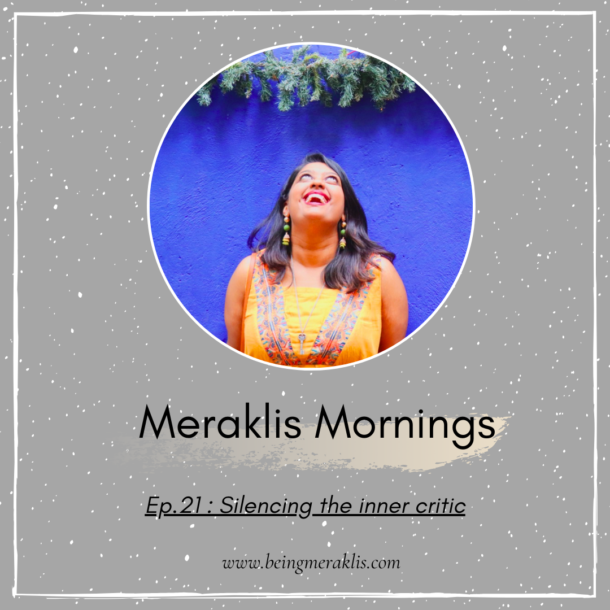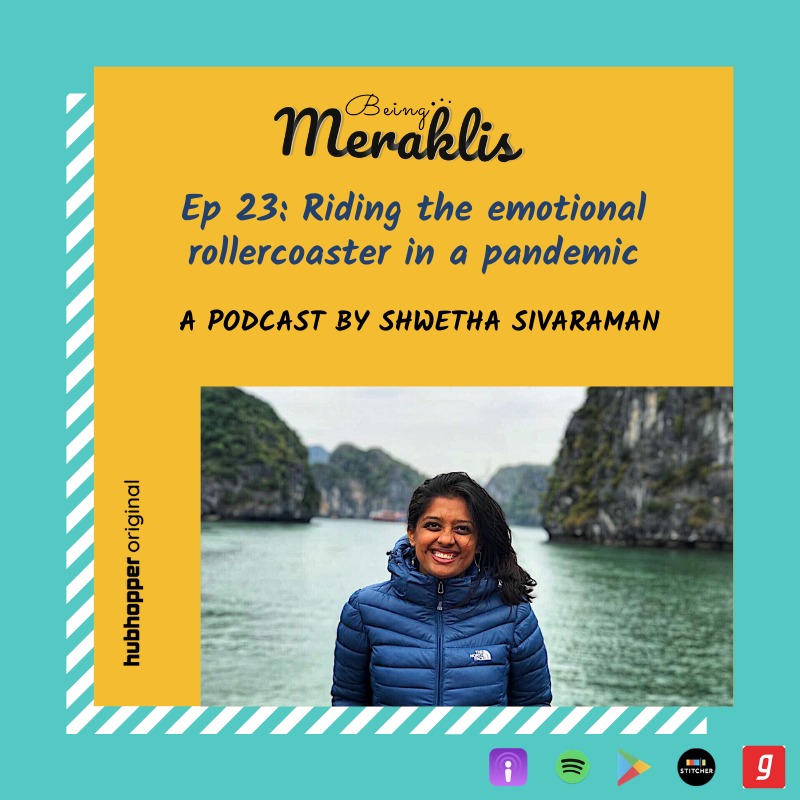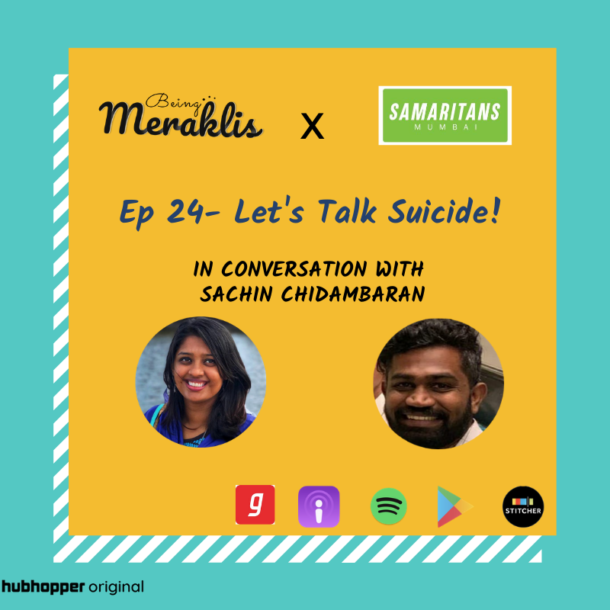
Ep 23 – Riding the emotional rollercoaster in a pandemic

Hello and Welcome back to a brand new episode on the Being Meraklis Podcast. In today’s episode Today I want to speak about “Riding the emotional rollercoaster during a pandemic.” The last three months have been nothing but an upheaval of diverse emotions. Oscillating between overwhelm and overcompensating, chaos and calm, despair and hope. The rollercoaster is fun in the short run but these swings in our emotions can impact us in the long run and that is exactly what we are going to speak in this episode – how can we build emotional resilience to deal with the chaos on the outside. How can we anchor ourselves so we feel more tethered, balanced as we navigate through this crisis.
So let’s begin. It is needless to say the pandemic has created an atmosphere of negativity that takes its toll on our health – both physical and mental. If you are in cities that are reasonably affected as I have, I am sure you’ve been indoors for 4 months and counting. And, that’s a lot.
There was a time when I was actually excited about grocery shopping every week, cause that was all we could go out for. But after 4 months even that is not enough. Both me and Saswat, my husband, love traveling and usually plan a trip almost every other month, even if its just a weekend getaway. I never realized how much it could affect us. I dream of the outdoors almost every other day, the wind in my hair, breathing in that crisp mountain air, surrounded by sounds of nature all around (rather than my neighbours kids wailing). Ah, I could almost feel that tingling sensation of liberation just imagining it. But here we are- trapped indoors.
We are pumped up and optimistic at once and in the next minute demotivated and down in the dumps. I’ve lost count of how many times I have had to press pause on work because there’s so much turmoil within. Anxiety about health and safety, stress over finances, uncertainty about when the lockdown would end, a sense of loneliness and, of course, the fear of the unknown – not knowing what next. We are brewing these emotions consciously and unconsciously. And these emotions can affect our way of life if not processed well. I have been constantly seeking more peace and quiet in life and have been searching for ways to find that balance within and 2 words prop to my mind
Emotional Intelligence
Two words that I have been constantly resorting to as it is the only thing we can rely to survive this pandemic.
Self-Regulation
The first thing about emotional intelligence is self-regulation. Begin with yourself – You can’t serve from an empty cup. We have a tendency of taking care of everyone around us while constantly ignoring our needs. That might not work in the long run. You need to press pause to become aware of your own emotions. Can you recognize them? Which of the emotions is controlling your actions? Are certain emotions overpowering you to make brash choices or paralyzing you from doing what is required?
Each of these answers will guide you to help understand where you are as far as your emotional well-being is concerned. Are you in a position to manage yourself or do you need help? I wasn’t sure of how to answer this question objectively as well, so did some research.
A few signs that you should look out for to know that it is time to reach for help:
– Being Short-tempered or increased irritability
– Lack of focus
– Loss of appetite or overeating
– Inability to sleep or sleeping too much
– Increased alcohol consumption or drugs
If you have been consistently noticing any of these signs, it might be an indication that you need help.
Managing emotions of those around us
How many years has it been since we have had the chance to spend so much time with our loved ones together within these 4 walls? Safe to say a while if not a lifetime. While the spending time part is great, we need to realize that emotions of those around us also influence our emotions. And this could lead to arguments, anger much quickly than before cause there’s no distraction or diversion to these emotions.
The only way to deal with managing the emotions of those around us is to set clear boundaries. Be assertive and firm about needing your time every time you need it. Irrespective of how healthy your relationships are, some me-time is necessary to rest and reset. Allow yourself the time and space to linger with just your thoughts and emotions.
And if you are already in an overwhelming relationship or are caught in a toxic environment, the situation could soon become difficult to cope with. The best thing to do is remove yourself from such environments where possible. Where not , assert your boundaries as best as possible. If you are finding that even setting those boundaries are difficult, reach out for help. There are several helplines for Domestic Violence, Psychological Help, Suicide Prevention, ensure you seek them out if you feel things are getting out of control.
So how can we take the reins of our emotions and maintain balance amidst excessive stress and uncertainty? Here are a few that have helped me :
Set a schedule
I have said this before and I say it again, schedules bring a semblance of control and stability. Even if you don’t do it to the T, have a morning waking up routine and an unwind routine before going to bed. You will be surprised how much this can make a difference. I have a morning routine everyday from 5 to 7 AM – no phone, some mobility, meditation and mindfulness, that sets the tone for my day every day irrespective of what is to come. Its like hitting the reset button every morning. I read fiction for at least 30 minutes before going to bed on bad days and for an hour on days I can afford it. One of the first things ongoing stress impact is sleep – having just a morning and an evening routine can help you protect this sleep so that the body can do its job of rejuvenating cells every night. Plan it and stick to it. If you want change, you have got to do the hard work.
Take time to unwind
You need to cut yourself some slack every now and then. Draw boundaries at work and ensure you give yourself some time and space to relax and unwind. Doing nothing is powerful to recharge those burnt out battery cells in our brains. Every time I have honoured my body’s need to pause and rest, I have seen increased productivity when I get back to my work. So if you find yourself stuck, stop ramming your head against the wall and instead step aside. Engage in anything else to take your mind away from what’s bogging you down before you get back.
Don’t try and do it alone
We could all do with a little bit of positivity, inspiration, and support from our loved ones and those whom we can count on. Ask for support on days you are feeling low. Reach out and share with those you can trust and know you are not alone. Don’t expect your friends or family to know that there’s something wrong. Remember they are also going through similar levels of stress if not the same intensity. Openly ask for help.
Move your body
Sitting in front of screens all day long is bound to impact us physically and mentally. Get out of that couch and move your body. It doenst have to be a rigid workout. Dance to your favourite numbers if that helps anything to release those endorphins in our body to reset chemical imbalances.
If there’s one thing I have observed the past few months it is that balance is the key. Every week that has been good was emotionally balanced without swings. We need to find that balance within us to stay stable. Still finding it hard to manage your emotions?
How have you been managing your emotions this pandemic?

